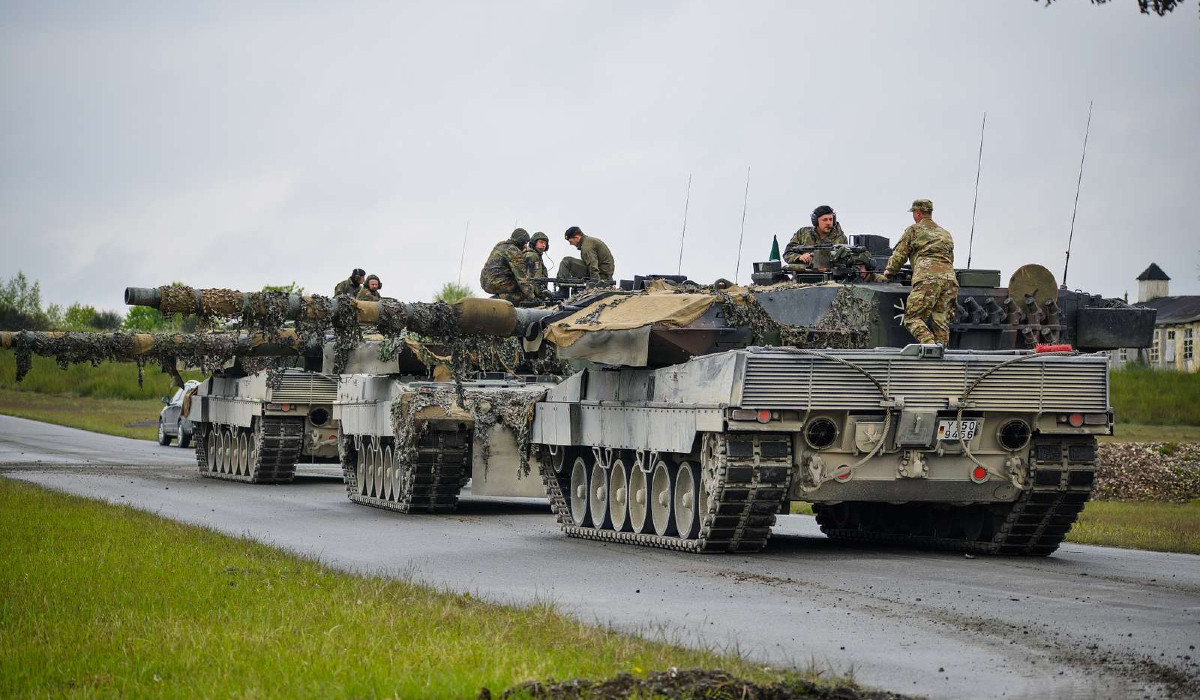 German Leopard 2A6 tanks prepare to move to their starting position. Photo: Javon Spence / US Army / DVIDS Public Domain
German Leopard 2A6 tanks prepare to move to their starting position. Photo: Javon Spence / US Army / DVIDS Public Domain
Getting the anti-war voice heard is an upward struggle, but it is one we must win. This is why Stop the War’s demonstration in London on 25 February is so important, argues Terina Hine
After sustained pressure from Kyiv, the US and Germany have announced they will supply main battle tanks to Ukraine, marking a serious escalation in the war. Berlin will send 14 Leopard 2 tanks, Washington 30 Abram tanks, both of which are considered to be among the most advanced in the world.
Fears that supplying the tanks could increase the risk of direct confrontation between Nato and Russia, were raised by Germany’s Chancellor Olaf Scholz before last week’s Nato pledging conference. But these have been set aside, as have Germany’s concern over the symbolism of German tanks rolling across Eastern Europe.
Not surprisingly Russia’s ambassador to Germany called the move ‘extremely dangerous’ saying it would ‘raise the conflict to a new level’. Russian-German relations have plummeted to a new low, with the ambassador quick to accuse Germany of turning its back on history. Until now Germany has been at pains to avoid German tanks being sent to the ‘eastern front’ in an echo of Nazi manoeuvres in the second world war.
Germany also agreed to train Ukrainian soldiers in the use of the weapons system and supply further ammunition. Significantly Scholz confirmed approval would be granted for the re-export of German tanks to Ukraine, enabling countries such as Poland and Estonia to send their state of the art German made tanks to the frontline.
As one Ukrainian government minister has said, a new tank coalition has been formed, open for all allies to join. So in addition to the US Abrams, the 14 German Leopard 2s and the UK Challenger 2 tanks promised last year, it looks as though Spain will supply 53 additional Leopard 2s, along with approximately a dozen from each of the Netherlands, Finland, Poland and Norway, with the Baltic states offering what they can. Sweden is expected to send 10-12 Stridsvagn 122 tanks (modernised Leopard 2s), and it has been suggested that Switzerland will now also allow the re-export of the Swiss Piranha tank, dropping their previous commitment to neutrality.
President Zelensky has campaigned to get the US and its allies to provide ever more weapons to the Ukrainian military. He is unlikely to stop now. Ukraine said they need 300 tanks, not just the 14 Germany has promised or the 30 from the US, so no doubt they will ask for more as Ukraine prepares for the expected spring offensive.
This supply of tanks will not enable Ukraine to defeat Russia, but it does begin a shift in the balance of weaponry offered, a shift from the defensive to the offensive. Now these tanks are going, more will follow, and then expect a similar push for jets.
The proxy war is advancing, and the stage is being set for an all out European war. Already at least 200,000 Russian and Ukrainian soldiers are dead or wounded, and much of Ukraine has been devastated; there are 30,000 recorded civilian casualties. The Ukrainian army cannot defeat a nuclear armed state like Russia without even more Nato support, but providing this support will only escalate or prolong the suffering.
Along with Britain, Germany has supplied the largest amount of weapons to Ukraine of all the European countries. But unlike here, in Germany there has been considerable opposition from the public and politicians, from the left as well as the right.
Sahra Wagenknecht, former Die Linke party leader, said that sending the tanks was a ‘madness that could end in catastrophe’ while one SPD MP raised justifiable concerns about what comes next, ‘fighter jets or battleships?’ going on to ask ‘Are we going to be talking about sending troops at some point?’. No such statements come from the mainstream of British politics or the media.
We now face a frightening escalation of the war and any opposition is muted in the British media. Getting the anti-war voice heard is an upward struggle, but it is one we must win. This is why Stop the War’s demonstration in London on 25 February is so important. We must demand our leaders stop pouring in arms and fuelling a proxy war that is increasingly bringing Nato into direct conflict with Russia. Instead we demand they push for peace talks and negotiations, before it is too late.
Join Revolution! May Day weekender in London
The world is changing fast. From tariffs and trade wars to the continuing genocide in Gaza to Starmer’s austerity 2.0.
Revolution! on Saturday 3 – Sunday 4 May brings together leading activists and authors to discuss the key questions of the moment and chart a strategy for the left.

